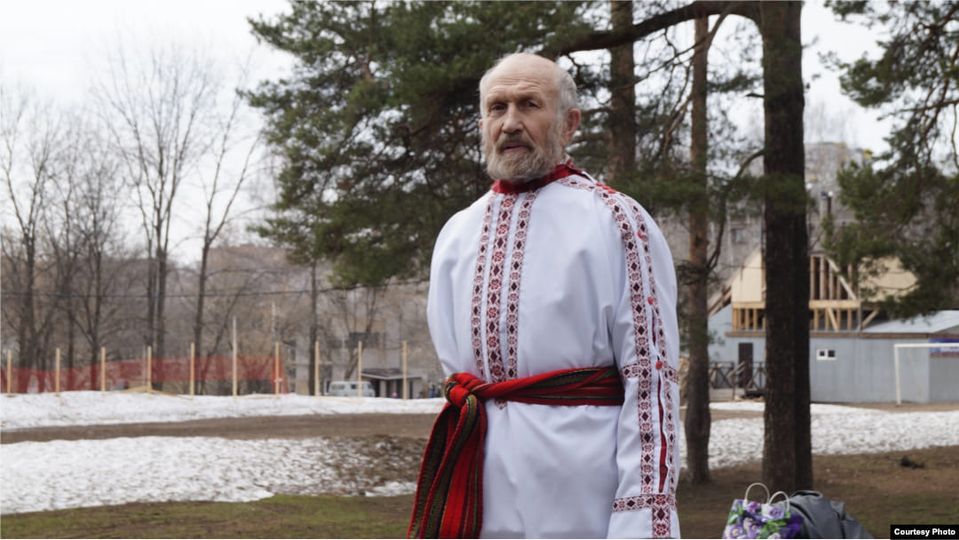The tragic fate of Albert Razin, a fighter for the Udmurt language

5 years ago, on September 10, 2019, Albert Razin, a 79-year-old Udmurt scientist and public figure, committed “tipshar’, an act of self-immolation near the building of the State Council of Udmurtia in Izhevsk. Banners were found next to him, in which he demanded to save the Udmurt people and language.
“Tipshar” is a form of extreme protest among the Chuvash and Udmurts to preserve honour and dignity in a situation that cannot be fixed.
This tragic event shocked not only Udmurtia but also all of Russia, drawing attention to the problems of preserving the national languages and cultures of small peoples.
Albert Alekseevich Razin was a candidate of philosophical sciences and an honoured scientist of the Udmurt Republic. Throughout his life, He actively fought for the revival of the Udmurt language and national customs. Razin stood at the origins of many national Udmurt organizations created after the collapse of the USSR, including the “Udmurt Kenesh” (Udmurt Council). He tried to stop the linguocide of the Udmurts by Moscow. It was not suicide, but a conscious act aimed at preserving national identity.
The scholar called himself a “peasant scholar” and a “Tolstoyan”, believing that the preservation of the Udmurt language and people was possible through a return to traditional communities and the revival of the village. He was known for his active civic position and constant desire to draw the attention of the authorities to the problems of the Udmurt people.
On the day of his death, Albert Razin went on a solo picket in front of the State Council of Udmurtia. He held two posters in Russian. One read: “Do I have a homeland?”, and the other – a quote from the Avar poet Rasul Gamzatov: “If tomorrow my language disappears, then I am ready to die today”.
Before his self-immolation, Razin handed out to passersby his address to the State Council deputies about the situation with the Udmurt language. In this appeal, he proposed many measures to preserve the Udmurt language and ethnicity, including mandatory study of the Udmurt language in schools, bilingual signs and street names, and support for rural areas as custodians of traditional culture.
The tragedy of Albert Razin was the result of accumulated problems and disappointments. He was deeply concerned about the situation with the Udmurt language and culture, believing that they were in danger of disappearing. Razin repeatedly approached the authorities with proposals to improve the situation but often received only formal responses.
The scientist was convinced that modern “Udmurtophobia” contributed to the formation of a feeling of “inferiority” among the Udmurts and the spread of suicide. He linked the high suicide rate among the Udmurts with a feeling of being “second-class” and a lack of self-esteem.
Albert Razin’s self-immolation caused a wide public resonance. Several hundred people came to the Udmurt Theater to bid farewell to the scientist. Many speakers spoke in Udmurt, emphasizing the importance of his struggle to preserve national culture.
However, the reaction of the authorities was ambiguous. The head of the republic, Aleksandr Brechalov, commented on the situation only a day after the incident, calling Razin “a man who contributed to the development of culture and the Udmurt language”. At the same time, he called for refraining from speculation on the topic of national policy in the republic.
Albert Razin’s tragedy has intensified the discussion about the future of the Udmurt language and culture. The Udmurt Ministry of National Policy offers modern approaches to popularizing the language, such as Udmurt discos, blogger competitions, and Udmurt-language websites. However, Razin considered these initiatives superficial and insufficient.
Independent Udmurt activists such as Alexey Shklyaev advance their agenda by organizing lectures, making films, and translating. They face difficulties and attention from law enforcement agencies, reflecting the complexity of the situation with national movements in the region.
Preserving the Udmurt language faces many difficulties. In Udmurt cities, especially in Izhevsk, there are practically no signs in the Udmurt language, and Udmurt speech is rarely heard on the streets. Many parents, even in rural schools, do not choose to have their children study the national language, fearing that this could interfere with passing the Unified State Exam in Russian and entering universities.
Udmurts make up about 30% of the republic’s population, with most of them living in rural areas. In cities, Udmurts often assimilate, losing touch with their native language and culture.
The tragic death of Albert Razin became the final argument in his long struggle to preserve the Udmurt language and culture. Many consider his act not as suicide, but as a sacrifice for the sake of his people. Razin wanted to draw public attention to the problems of the Udmurt language and urge people to think about their attitude toward their native culture.
Despite its tragic nature, Albert Razin’s act made many people think about the fate of the small peoples of Russia and their languages. His struggle continues to inspire activists and scientists working to preserve national cultures.
The story of Albert Razin is the story of a man who was devoted to his people and their culture to the end. His tragic death became a symbol of the struggle to preserve the national languages and identity of the small peoples of Russia.